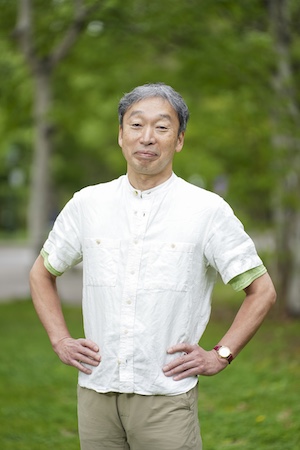My name is Yasuhiro Kawabata, and I’m a member of the Faculty of Humanities and Human Sciences. I’ll be serving as dean of the Faculty of Humanities and Human Sciences, the Graduate School of Humanities and Human Sciences, and the School of Humanities and Human Sciences from April 2024 to March 2026. Born in Sapporo in 1961, I grew up here. I entered Hokkaido University in 1980, so I’ve been here for quite a while. Dr. William Smith Clark’s famous phrase “Be ambitious!” is generally translated into Japanese as “Taishi wo idake.” Taro Yamashita, who founded the Arabian Oil Company and was an alumnus, said that the word “ambitious” has a more “adventurous” connotation than the translation “taishi” has, so he taught the expression as “Yamashitare (Be adventurous).”
 I’ve seen the Cold War, rapid economic growth, the bubble economy and its collapse, deflation and stagnation, and geopolitical risk in Hokkaido, and I believe that the faculty is a promising group of adventurers in the midst of the great swells of the times, even from a global perspective. As you can see from the website, content on almost the full range of diverse and fascinating humanities and integrated arts and sciences subjects is available. (The content is offered especially in consideration of Hokkaido University’s role as a base university in the northernmost part of Japan). We have an environment where you can choose the area you think is right for you and study it in depth, interdisciplinarily. About 620 kind, ambitious undergraduate students, 230 master’s students, 180 doctoral students, 130 faculty members, and 20 administrative staff fulfill their workday and night. Hokkaido University occupies a vast site in the center of Sapporo, including unspoiled forest and farmland. (The School of Humanities and Human Sciences is located in the middle of the site.) It is, as it were, a miniature garden for the entire Hokkaido region. Starting from exercises in this garden, we’ve been working, with Hokkaido, other northern regions, and the world (real and cyber) as our field.
I’ve seen the Cold War, rapid economic growth, the bubble economy and its collapse, deflation and stagnation, and geopolitical risk in Hokkaido, and I believe that the faculty is a promising group of adventurers in the midst of the great swells of the times, even from a global perspective. As you can see from the website, content on almost the full range of diverse and fascinating humanities and integrated arts and sciences subjects is available. (The content is offered especially in consideration of Hokkaido University’s role as a base university in the northernmost part of Japan). We have an environment where you can choose the area you think is right for you and study it in depth, interdisciplinarily. About 620 kind, ambitious undergraduate students, 230 master’s students, 180 doctoral students, 130 faculty members, and 20 administrative staff fulfill their workday and night. Hokkaido University occupies a vast site in the center of Sapporo, including unspoiled forest and farmland. (The School of Humanities and Human Sciences is located in the middle of the site.) It is, as it were, a miniature garden for the entire Hokkaido region. Starting from exercises in this garden, we’ve been working, with Hokkaido, other northern regions, and the world (real and cyber) as our field.
There was a fellow who graduated after me. He majored in religious and Buddhist studies in the Faculty of Letters (now the School of Humanities and Human Sciences) and was in the mountain skiing club. After joining a construction machinery company, he studied Spanish intensively and was transferred to South America, where he’s been busy maintaining hydraulic excavators on that vast continent. When I went to Mt. Chimborazo in Ecuador in 1997, he came from Chile, and he looked like he totally fitted in with the local community. He’s currently using IT in Japan to control maintenance systems for machines that operate at construction sites around the world. He can be described as one of those adventurers who freely walk the world’s mountains, interacting in various languages and using Hokkaido University as his home base.
Hokkaido and Japan have faced economic and student employment challenges in recent decades, and over time, the social demands on us have increased. As Japan’s intellectual and economic prosperity becomes more visible in the future, universities are becoming a major source of human resources for a wide range of businesses, groups, and organizations. My goal is to produce such people from the School and Graduate School of Humanities and Human Sciences of Hokkaido University. Be an interesting adventurer in life!
Yasuhiro KAWABATA, dean
Faculty/Graduate School/School of Humanities and Human Sciences,
Hokkaido University


